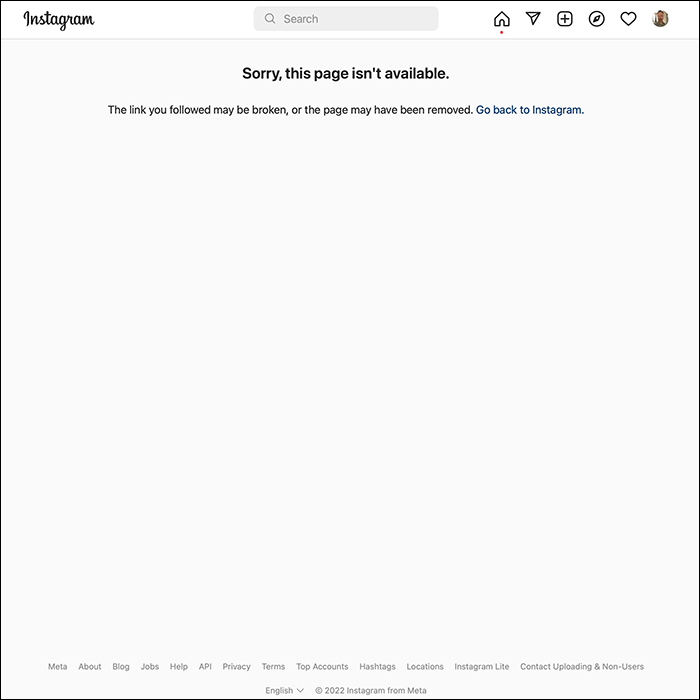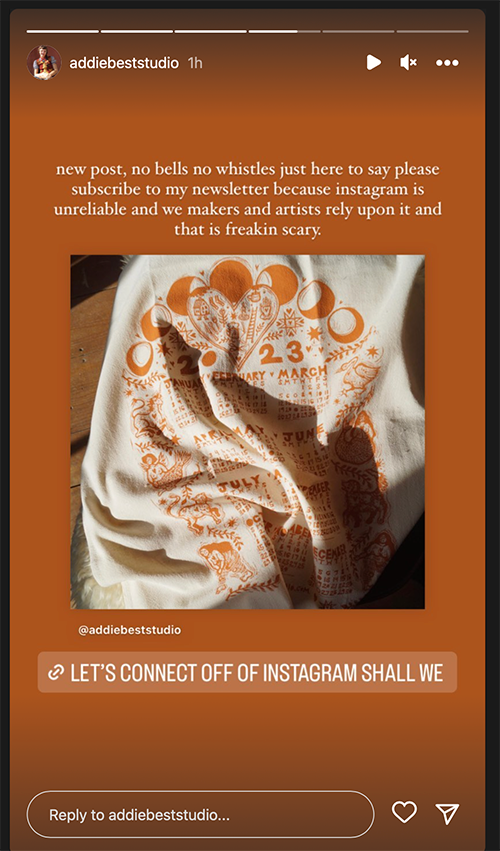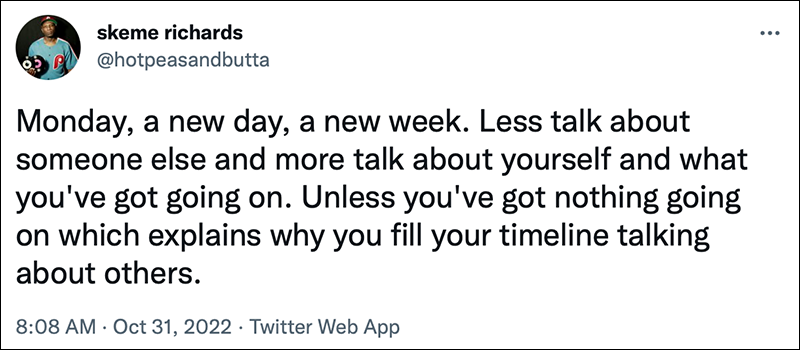I have seen so much discussion recently about social media and email newsletters. Today, I want to encourage something critical: Focus on your goals as a writer and the experiences you want to have with readers. I worry that focusing too much on what each social network provides (the trends, the algorithms, etc.), has us ignoring our own creative vision. And in the process, ignoring the moments that truly matter in living your life as someone who writes, who reads, and who is in conversation with others who write and read.
I’ll put my suggestions up front here, then dig into each more deeply below:
- “Own” your connection to people who support your work
- Yes, you can unfollow people
- Yes, you can talk about yourself
- Forge the path that makes sense for you
Okay, let’s dig in…
“Own” Your Connection to People Who Support Your Work
Should you leave a certain social network? Or all of them? Should you sign up for one newsletter service? Or another? Regardless of what you choose, I want to encourage you to own the ability to reach those you are connected This could be your professional connections, or writers you met at a retreat last summer, or who you met in a writing class six years ago, or a reader you met at a literary festival, or anyone who supports your work and cares about the themes you write about.
Can you develop your following on Instagram? On Substack? On LinkedIn? Sure. I’m not here to argue for one or the other, you can find endless debate on that elsewhere online. For whatever you choose, I encourage you to:
- Work cross-channels. While you can focus primarily on one channel, give people other ways to connect with you as well.
- Back up your connections. Don’t assume that some social network will preserve your profile or list of followers. You should have a copy of that.
- Be proactive in attending to 1:1 relationships. Stop just looking at your follower count. Show up to engage with others as if they are real people. Because they are.
This week an artist I follow (Addie Best) shared something that was scary. You see, for several years now, she has shared her printmaking on Instagram, amassing 44,000 followers, and developing an entire business/career partly through Instagram. Here, let me show you here Instagram account:

Oh. Wait, that’s not good. That’s right, like many people earlier this week, her account got caught in a glitch, and it was deleted. All of her 700+ posts, all of her 44,000 subscribers, and the primary way she markets her prints. Luckily, her account was back within hours, and then she posted this:

What is she encouraging her followers to do? How is she diversifying the connection to her audience? A few things:
- The primary one is to encourage people to subscribe to her email newsletter. Why? Because that not only gives her permission to email them, but she “owns” access to their email address. She can use that on any email platform.
- Support her on Patreon. She has nearly 350 supporters there, and they pay $1 to $20 per month. I have to imagine many of them pay the $10 per month level because that is where you automatically get a block printed patch in the mail, which is one of her biggest sellers.
- She has an online shop where you can purchase her work, and she is very good about communicating when she will release new products to purchase.
- She mentioned her dream of being able to directly mail a physical catalog to her supporters. I can honestly see that becoming a reality for her. Again, that would be a direct connection, because she would “own” the right to send you something to your physical address. Which is different that, say, selling through Amazon where the creator doesn’t get the address of the buyer, only Amazon has access to that.
Now, perhaps you don’t have a full-time business like Addie. At the very least, I would encourage you to regularly download your data from any social network you are active on. Yes, all the major social networks allow you to download the content you shared, the information of people who follow you, links to who you follow, etc. I mean, just imagine the difference this makes if a specific social network every just randomly booted you off: having no record of who followed you vs. you having a clear list of those names and links to their accounts.
While you are at it, back up your writing, your photos, etc. I wrote a whole post about this back in March, which I highly recommend you check out: Preserve What You Create.
To me, this is honoring the connection you have with others. Whether they be readers, colleagues, friends, or others. Why offload something so important to some company? That is a responsibility that we should each show up for.
Yes, You Can Unfollow People
Back in 2021, I wrote about a social media reset I was doing. An excerpt: “To optimize my social media for a feeling of deep connection, I had to do something I have resisted for years: unfollow people. In some ways, this has been an arduous process.
So much of being on social media is about wanting to be liked. To hope that others care about what you share, and that in the process, you get to validate the work of others. To unfollow someone feels like the antithesis of all of these things.”
Before that time, and after, I have had periods where I have unfollowed people. It is always — always — something I hesitate to do. But I do it for important reasons:
- To respect my own creative goals. I am a big believer in getting clarity on what you create and why, of where you can put your attention, energy, and time. Limits help me focus my day for the moments and experience that fill me up.
- To respect others. There is a reality that I simply can’t pay attention to as many people as I would genuinely like to in a day. Years ago, I remember reading about “Dunbar’s Number,” which “suggested cognitive limit to the number of people with whom one can maintain stable social relationships.” (via Wikipedia.) Even for the people I don’t follow, I want to show them respect. I don’t want to follow them in order to pretend I am paying attention, when I’m not. Because that would be like saying, “Oh, I LOVED your book,” when you haven’t read it at all.
- To manage my own mental health. I am unbelievably lucky, but I’m also going to be very honest: running a business, raising my 5 year old and 12 year old, showing up for my wife and our home, and attending to my health is a lot. With my limited energy and attention, I can’t do everything I dream of. I have to focus on the things things each day that matter most to me. I can’t “do it all,” and I don’t want to drive myself over an edge trying to.
- As I mentioned last week, I feel that limits are powerful drivers to creativity and connection. The idea of “what if I followed only 300 people — or only 100 people — or only 10 people” is a compelling prompt for me to consider in terms of depth of connection, not just breadth. Too often when we discuss social media, we only talk about quantity, not quality. But I’m curious about where limits can take connections that are rare and meaningful.
The other day I was reading an interview in Melinda Wenner Moyer’s newsletter. Author and clinical psychologist Yael Schonbrun introduced this concept builds upon the work of Leidy Klotz of the value of subtraction in our lives. Of focusing on less, not more.
“What the science shows us in terms of the cognitive piece is that we have a hard time doing the action of subtracting, and it’s because it often doesn’t occur to us. We engage in what’s called subtraction neglect. We don’t even think about it. What’s more, when we are overwhelmed, that tendency to neglect subtraction grows stronger. So the busier you are, the less likely you are to take something off your plate, which is really unfortunate.”
It reminded me of a discussion I saw online where one author noticed that another author had unfollowed them, and they weren’t happy about it. A long conversation followed where people commented about the motivation of the author who unfollowed. I don’t know the history of these relationships, but it was fascinating to see how quickly people assigned the act of unfollowing as “obviously” petty, and fueled by a negative intention. Perhaps that was the case in that instance, I have no idea. But I know it’s something people struggle with this, concept of clarity and focus in how they engage. So I simply wanted to encourage you that you can unfollow people. And that it can be a positive act.
Yes, You Can Talk About Yourself
Over the years, I have heard this repeated countless times as people describe what the “best” strategy for using social media is: “Talk about others 90% of time, and yourself 10% of the time.” Of course, I appreciate the place this comes from: the idea that generosity is a critical part of being a part of a community, and that lifting up others prevents social media from becoming a festival of self-promotion.
But the other day I saw this Tweet the other day from Skeme Richards:

Now, maybe you agree or maybe you don’t. But it got me thinking.
In conversations I have with writers and creators, something comes up pretty often: a fear of being seen. Sometimes it is expressed as a deep-seated feeling that “I was raised to not talk about myself.” That to not talk about yourself is somehow noble and honorable. And those who talk about themselves are… bad. Bad bad bad people. Other times, that feeling of not wanting to be seen comes up a different way, like how I referenced above, as a strategy for “social media best practices.”
Yet something I was considering as I thought about Skeme’s words is that the people who I love following, spend a lot of time taking about their work, their process, and why they create. People like:
- Skeme Richards himself
- Debbie Ridpath Ohi
- Kelli Anderson
- Janae Marks
- Meera Lee Patel
- Betsy and Dan at Foggy Blossom Farm
- Nikki Grimes
- Rebecca Green
- Megan Carty
- Marcía Lynn Paul
- Colby Sharp
- Jason Reynolds
Do they also talk about others in the process? Yes! All the time! But it is in service of creative work and themes that resonate and sharing their life with me. So, why do they talk about themselves? Because they are:
Doing. The. Work.
Day in and day out, they are showing up for their craft. They are in conversation with people. They are making new connections. They are pushing themselves past creative boundaries. They are sharing the sometimes difficult reality of the creative life, not just the highlight reels. This means they are showing the struggles, the nuance, the process, and so much more.
I have done the work I do full-time for 12 years because I deeply admire writers and creators. I get emotional just writing that. For someone to have a creative vision. To take the risk to create. Then, to share. That is what fuels my heart.
So… yes, you can talk about yourself. Because in doing so, you are doing so much more. You are sharing reality of the creative work. You are sharing themes that matter most to you. In doing so, you are giving others permission to share and engage on these same topics that you explore. You are opening up possibility for connections.
Forge the Path That Makes Sense for You
In my book, Be the Gateway, I talk about ignoring best practices. Not that they can’t be useful, but too often, people try to use them as shortcuts, when the reality is that they deliver a fraction of the value they did years ago. I encourage you to find the path for how you share that feels right to you. And sometimes that means you have to see things that others can’t. Even the experts.
I was listening to an interview this week where Matt Damon described a conversation he had with Tom Cruise. You can watch it here, but this is the gist of it:
- Matt asks Tom how he did a stunt in a Mission Impossible movie, one where he is running along the side of a building at 1,700 feet above the ground, just on a tether.
- Tom talked about how he had the vision for this stunt for 15 years.
- When production began, Tom met with the safety guy on the set and described what he wanted to do.
- The safety guy says, “You can’t do that. That’s too dangerous.”
- Then Tom continues the story, “So I get another safety guy…”
Meaning: Tom had to find a collaborator who shared his vision for what was possible, even if it broke standard assumptions for what was possible. Now, you may not like Tom Cruise, or this kind of stunt, or these kinds of movies. But I want to encourage you to find a path that does feel right to you. Where you can open up your creativity and connection with others in ways that feel deeply meaningful to you.
Forge a path that honors your connection with readers and other creators. That should be the foundation for how you create and share.
Thanks.
-Dan
